Dear readers,
Tomorrow is May 22nd, the International Day for Biological Diversity ─ a good time for our next newsletter. Many people and organisations around the world, including members of our network, use this day for a variety of actions. However, ‘Biodiversity in Good Company’ is mainly concerned with a longterm and sustainable commitment of businesses. Therefore, the progress reports of our members are a centerpiece of our initiative. We would like to invite you to have a look at the current reports, for example the one of HiPP!
Our today’s member portrait is dedicated to this company. For HiPP as a baby food manufacturer, the most effective influential lever lies on the agricultural front. The company’s commitment to biodiversity is closely linked to its commitment to healthy soil. So the 2015 International Year of Soils provides a good opportunity for a stakeholder dialogue on this important resource.
By the way: There is also a German version of this newsletter available which contains some further news.
Yours sincerely,
'Biodiversity in Good Company' Initiative
| |
|---|
|
|
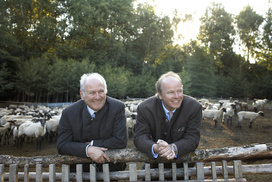 Prof. Claus Hipp and Stefan Hipp, Shareholders at HiPP
Prof. Claus Hipp and Stefan Hipp, Shareholders at HiPP
|
|---|
|
»The company HiPP is convinced that protecting biological diversity and the balance of nature also means an intransigent "no" to GMOs and green genetic engineering as they lead to an agriculture based on monocultures.«
|
|---|
|
|
HiPP protects biodiversity – Results of the new 2013/2014 Progress Report from the baby food manufacturer now available
| |
|---|
|
Healthy plants, healthy food, healthy people. The protection of biodiversity is essential to sustaining the harmony of these three elements. With this in mind, HiPP produces organic foods for the most sensitive of consumers: babies and toddlers.
Conventional animal and arable farming, however, often seriously challenge our eco-system, and the resulting problems are becoming increasingly apparent. As one of the world’s largest organic baby food manufacturers, HiPP will also be dependent on an intact environment in the future. Interventions in nature should neither cause major damage, nor any harm to the system - specifically the interaction of soil, plants, living organisms, water and air.
HiPP places great importance on the protection of biodiversity and has declared it a major priority. In HiPP’s sustainability management programme, biodiversity has its own, independent division, and is a stated goal of the company. The biodiversity manager’s job is to analyse and assess the impact of all of HiPP’s corporate activities.
The results of the current Progress Report 2013/2014 to the Leadership Declaration of the 'Biodiversity in Good Company' Initiative provide an insight into various measures and projects that the baby food manufacturer has initiated as a contribution to conserving biodiversity.
| |
|---|
|
|
Central measures for the protection of biodiversity, where agriculture and business meet
| |
|---|
|
For HiPP as a food manufacturer, the most effective influential lever lies on the agricultural front, which plays a central role in quality assurance and environmental protection. HiPP is currently one of the largest organic processors worldwide, with more than 8,000 contracted farmers.
| |
|---|
|
|
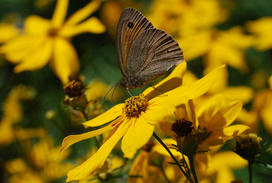 Photo: HiPP
Photo: HiPP
|
|---|
|
One central project for the protection of biodiversity is the Ehrensberger Hof farm at Pfaffenhofen, which has been run by HiPP as a "model farm for biodiversity" in the form of a research institute for the last six years.
|
|---|
|
|
Here, scientists and nature conservation organisations work together with HiPP to test measures for improving biodiversity, to show how sustainability and the preservation of biodiversity can be successfully integrated into daily life on the farm. The long-term aim is to develop a practical model for the HiPP manufacturing businesses, as well as indicators for biodiversity and "products manufactured in a biodiversity-friendly way".
In 2012, this concept was expanded to the "Businesses encourage diversity" project by HiPP together with other companies in the Association of Ecological Food Manufacturers, AöL. The project is supported by the German Federal Environmental Foundation, DBU, and first results will be presented to the public at the BIOFACH trade fair in 2016.
| |
|---|
|
|
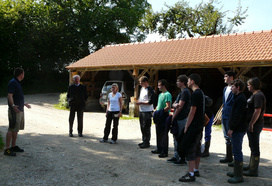 Guided tour at the model farm for biodiversity. Photo: HiPP
Guided tour at the model farm for biodiversity. Photo: HiPP
|
|---|
|
Since 2012, HiPP has also been offering guided biodiversity tours of its model farm, for staff training, for students or indeed anyone else who is interested. It is, above all, the younger generation who need to literally get their hands on the subject of biodiversity. With this in mind, nearly a hundred groups have gained an insight into this important topic since 2012.
|
|---|
|
|
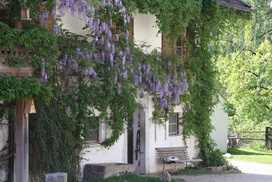 Greening HiPP‘s farmhouse facade in Pfaffenhofen. Photo: HiPP
Greening HiPP‘s farmhouse facade in Pfaffenhofen. Photo: HiPP
|
|---|
|
Biodiversity Day on 22nd May 2015
| |
|---|
|
Once again on this year’s Biodiversity Day, Armin Günter, who is responsible for biodiversity at HiPP, will guide 40 students from the paediatric department at the Friedrich Alexander University in Erlangen through the Ehrensberger Hof farm and provide them with practical insights into the possibilities and the significance of biodiversity protection.
|
|---|
|
|
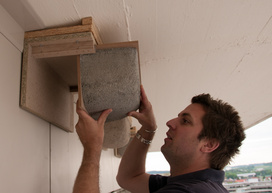 Photo: HiPP
Photo: HiPP
|
|---|
|
It is often the small things, which everybody can do, which have the greatest impact. For example, the numerous nesting boxes which HiPP, in cooperation with the Bavarian Bird Protection Society (LBV), mounted at the farm and the factory premises over recent years, have helped to increase the settlement of rare and useful bird species. On 22nd May 2015, HiPP will be creating further habitats on the company’s land, this time to support the breeding of swifts.
|
|---|
|
|
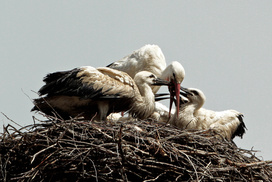 Photo: Muthsam/ LBV Bildarchiv
Photo: Muthsam/ LBV Bildarchiv
|
|---|
|
German Campaign Days for Sustainability 2015
| |
|---|
|
Also on the German Campaign Days for Sustainability, HiPP will be carrying out a very special campaign concerning research into the living conditions of the white stork.
|
|---|
|
|
The presence and number of white storks is a clear indication of the status of biodiversity in many regions, because storks need an abundance of food and an unspoiled habitat to be able to rear their young.
| |
|---|
|
|
To strengthen awareness amongst school children of the importance of the environment and the interactions that can be found in it, HiPP is sponsoring a camera and a transmitter for stork observation at the Schyren-Gymnasium grammar school in Pfaffenhofen. Through this initiative, in cooperation with the Bavarian Bird Protection Society (LBV), the school children can observe (online) "their" storks nesting on the school roof as part of lessons. They will also be able to follow flight paths via an app.
|
|---|
|
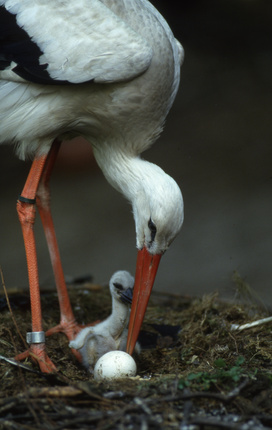 Photo: Stöcklein/LBV Bildarchiv
Photo: Stöcklein/LBV Bildarchiv
|
|---|
|
|
UN Initiative "Year of Soils"
| |
|---|
|
Biodiversity is not only about what goes on in the air and on the ground. Healthy soil with plenty of humus is essential for biodiversity and the entire eco-system. The 2015 "International Year of Soils" declared by the UN provides the opportunity for HiPP to focus dialogues with stakeholders on the quality of the soil. A sales promotion in the shops should illustrate to consumers, with different kinds of information and competitions, that healthy soil is essential for biodiversity and the entire eco-system.
| |
|---|
|
|
+++ BIODIVERSITY PIECES +++
| |
|---|
|
|
Learn more about our members: The Progress Reports to the Leadership Declaration
| |
|---|
|
A good practice of transparent sustainability reporting pays tribute to all material aspects of the company and its value chain. By becoming a member of 'Biodiversity in Good Company', our member companies acknowledge biodiversity and ecosystem services to be material. On a completely voluntary basis, they have committed to delivering progress reports every two years. The reports for the 2013/2014 period a currently being published. Have a look! Biodiversity is a very challenging reporting issue, and only a minority of companies explicitly addresses the challenges. The Parties to the Convention on Biological Diversity (CBD) at their 12th meeting in Korea in 2014 (COP 12) put a special emphasis on the gaps in reporting in their Business Decision. We will contribute to the discussion with our experience gained in recent years.
|
|---|
|
|
|
Aleph’s organic farming activities on rice paddies
| |
|---|
|
The Soil Microbial Diversity Vitality Value (copyright of DGC Technology Inc.) is a numerical index calculated by integration of functional diversity, organic substances degradation speed, and rapidity of the ignition of the degradation in soil microbial community tested. Aleph uses this method to show the effects of organic farming on the soil. In rice paddies of four farmers and Aleph, higher values are indicated in rice paddies that have been kept organic for long years. Organic farming makes good soil, through enhancing biodiversity of invisible microbes. Further information / Aleph 2013-2014 Progress Report
|
|---|
|
|
|
The 350 toom Baumarkt DIY stores of REWE Group will no longer be selling products containing glyphosate by 30 September 2015 at the latest. With this step, toom Baumarkt DIY stores pre-empt the upcoming decision on the extension of the EU approval for glyphosate.
|
|---|
|
|
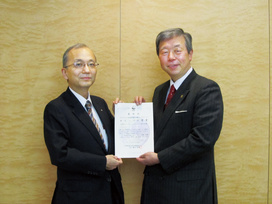 Toru Takakura, Managing Director of SuMi TRUST, received the "Olive Leaf Award” from the Secretary General of WWF Japan
Toru Takakura, Managing Director of SuMi TRUST, received the "Olive Leaf Award” from the Secretary General of WWF Japan
|
|---|
|
SuMi TRUST received the "Olive Leaf Award", the second best prize given to excellent Japanese companies in terms of biodiversity activities, which were determined by the WWF Japan.
|
|---|
|
|
|
Volkswagen hands out garden plants for biological diversity in employees' backyards on occasion of the International Day for Biological Diversity on 22nd May 2015.
|
|---|
|
|
EU State of Nature Report – mixed results, but a long way to go
| |
|---|
|
The majority of habitats and species in Europe have an unfavourable conservation status despite significant improvements for many species in recent years, according to a new technical report published by the European Environment Agency (EEA) on 20 May 2015. "The results are mixed but clear. When implemented well, conservation measures work and improve the status of habitats and species on the ground. Such improvements remain limited and patchy, and unfortunately Europe’s biodiversity is still being eroded overall and the pressures continue", said Hans Bruyninckx, EEA Executive. Habitat types, on the whole, show a worse conservation status and trend than species, as only 16 % of habitat assessments are favourable.
Key findings and summaries under http://www.eea.europa.eu/highlights/state-of-nature-in-the and http://europa.eu/rapid/press-release_IP-15-4965_en.htm
| |
|---|
|
|
Public consultation process on EU Nature Directives Fitness Check
| |
|---|
|
As part of the European Commission's Fitness Check of the Birds and Habitats Directives, the Commission published an online public questionnaire on 30 April, which is now open for responses for 12 weeks. The intention of the Fitness Check is to gather evidence about the performance of the two Nature Directives and will seek to assess whether they are “fit for purpose”. The questionnaire gives an opportunity to interested individuals and organisations across Europe to provide their views on key issues relevant to the assessment. The results will be published in the autumn and an initial output from the analysis will be given at a conference in Brussels on 23 October 2015. They will also feed into the Commission report on the results of the Fitness Check which is due to be issued in early 2016.
| |
|---|
|
|
INSPIRATION – EU research project underlines key role of land use and soils
| |
|---|
|
Biological diversity, like many major resource challenges, is closely related to land use and soil management. It was high time to give more attention to the key role of land and soil as they are not dealt with adequately in public perception. So 2015 deserves to be the International Year of Soils. On 1 April 2015, 21 institutions from 16 European Countries, under the coordination of the German environmental protection agency UBA, launched the EU research project INSPIRATION – "INtegrated Spatial PlannIng, land use and soil management Research AcTION". The aim of INSPIRATION is to adopt a funder and end-user demand-driven approach to establish and promote the adoption of the knowledge creation, transfer and implementation agenda for land use, land-use changes and soil management in the light of current and future societal challenges. Initial information in English.
| |
|---|
|
|
|
Worth reading: On the edge – a report by Claude Martin to the Club of Rome
| |
|---|
|
Tropical rainforests are not just massive repositories of biodiversity, but everyone on the planet relies on this essential ecosystem for fresh water, clean air, and climate regulation. With "On the Edge", Claude Martin, former Director General of WWF, has addressed a report to the Club of Rome. The book takes a close look at deforestation and reforestation throughout the world and assesses the remaining opportunities for conservation. On The Edge: The State and Fate Of the World's Tropical Rainforests, by Claude Martin, published by Greystone Books 2015
|
|---|
|
|
|
|